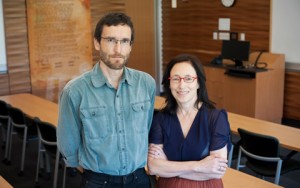
Professors Gordon Christie (left) and Darlene Johnston (right) will be teaching the new Aboriginal Rights and Treaties in Canada course this fall.
“Aboriginal law has always been strongly recommended in the law school’s upper year curriculum, but historically it has had one of the lowest enrollments,” says Professor Darlene Johnston who will be one of four instructors teaching the course this spring. “It sends a strong message to our students and to the legal community, that we consider this area of law to be a core competency.”
This is one of many changes affecting law schools across Canada as new accreditation rules require graduates to demonstrate competency in the rights of Aboriginal peoples in Canada. Law schools can meet this requirement in different ways and UBC has chosen to create a separate mandatory course dedicated to Aboriginal law.
“Although the substance of what will be taught may be similar from school to school, this symbolic change allows us to highlight the leadership role that BC has had in the development of Aboriginal rights in Canada,” says
Dean Mary Anne Bobinski.
The majority of the cases dealing with Aboriginal land claims and treaties that have reached the Supreme Court of Canada, have come from B.C. There are more than 200 First Nations communities in B.C., with only a very few having signed treaties with the Crown, leaving a significant number of outstanding claims to Aboriginal title and rights.
“There’s a lot at stake for First Nations in B.C. as well as for British Columbians generally,” explains Johnston.
“There’s so much that needs to be resolved and courts are playing a major role in reconciling the broader public interest with the rights and titles of Aboriginal people.”
It’s an area of law that Johnston agrees is complex and will continue to grow. Whether it’s resource development, fisheries, forestry or pipelines, there is a clear obligation to consult First Nations communities.
“There aren’t enough Aboriginal lawyers to service all the needs of this community, so it’s important that non-Aboriginal lawyers be in a position to understand these rights and to serve as advocates.”
The Faculty of Law was one of the first faculties in Canada to offer a program in First Nations Legal Studies, and recruits more Aboriginal students than any other law school in the country. Many students are drawn to UBC by the opportunity to work at the Faculty’s legal clinic, which serves Vancouver’s urban Aboriginal population in the downtown eastside.
“I’m really happy as an Aboriginal scholar to be teaching in a school that has made it clear that the rights of Aboriginal people are a central part of the constitutional law in this country,” says Johnston.